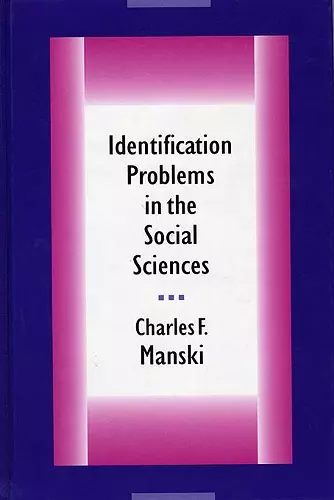Identification Problems in the Social Sciences
Format:Paperback
Publisher:Harvard University Press
Published:14th Apr '99
Currently unavailable, and unfortunately no date known when it will be back

This book provides a language and a set of tools for finding bounds on the predictions that social and behavioral scientists can logically make from nonexperimental and experimental data. The economist Charles Manski draws on examples from criminology, demography, epidemiology, social psychology, and sociology as well as economics to illustrate this language and to demonstrate the broad usefulness of the tools.
There are many traditional ways to present identification problems in econometrics, sociology, and psychometrics. Some of these are primarily statistical in nature, using concepts such as flat likelihood functions and nondistinct parameter estimates. Manski's strategy is to divorce identification from purely statistical concepts and to present the logic of identification analysis in ways that are accessible to a wide audience in the social and behavioral sciences. In each case, problems are motivated by real examples with real policy importance, the mathematics is kept to a minimum, and the deductions on identifiability are derived giving fresh insights.
Manski begins with the conceptual problem of extrapolating predictions from one population to some new population or to the future. He then analyzes in depth the fundamental selection problem that arises whenever a scientist tries to predict the effects of treatments on outcomes. He carefully specifies assumptions and develops his nonparametric methods of bounding predictions. Manski shows how these tools should be used to investigate common problems such as predicting the effect of family structure on children's outcomes and the effect of policing on crime rates.
Successive chapters deal with topics ranging from the use of experiments to evaluate social programs, to the use of case-control sampling by epidemiologists studying the association of risk factors and disease, to the use of intentions data by demographers seeking to predict future fertility. The book closes by examining two central identification problems in the analysis of social interactions: the classical simultaneity problem of econometrics and the reflection problem faced in analyses of neighborhood and contextual effects.
Manski's provision of nonparametric bounds is insightful. The book also gives lucid and methodical exposition of the techniques involved and illustrative examples. Above all, its reminder that our conclusions can only be as good as our assumptions and its thoughtful remarks on the limitations of controlled experimentation in program evaluation research are incisive. Manski's self-reflective and circumspective critique and offer of solutions are surely commendable...The book provides an illuminating discussion of a fundamental problem in social research. -- Raymond Sin-Kwok Wong * Contemporary Sociology *
A landmark book in social science methodology. No sociologist who takes statistical methods seriously can afford to ignore it...The book is written in plain and lucid English...Manski's book gives us good directions to follow to solve various practical problems in the future...Identification Problems in the Social Sciences is a great book to read...You will surely admire the book's elegance and logical clarity. I highly recommend the book. -- Yu Xie * American Journal of Sociology *
ISBN: 9780674442849
Dimensions: unknown
Weight: 236g
194 pages